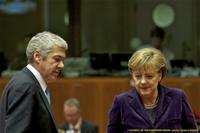Portugal without a government, but probably with a bail-out
Ralitsa Kovacheva, March 24, 2011
 Portugal is headed toward early elections after Prime Minister Jose Socrates submitted the resignation of his Socialist government. Late in the evening of March 23rd the parliament rejected the austerity package, proposed by the government in an attempt to reduce the budget deficit.
Portugal is headed toward early elections after Prime Minister Jose Socrates submitted the resignation of his Socialist government. Late in the evening of March 23rd the parliament rejected the austerity package, proposed by the government in an attempt to reduce the budget deficit.
This was the fourth austerity package for the last 11 months, with which the government is desperately trying to avoid the need of a bail-out. All opposition parties, however, voted against the proposed spending cuts and the prime minister found himself forced to realise his promise to resign. Country's President Aníbal Cavaco Silva is still silent on the issue but he is likely to call elections two years earlier than the regular ones.
The news emerged hours before the important European Council at which it is expected EU leaders to finally decide on the creation of the permanent rescue fund for the eurozone - the European Stability Mechanism (ESM), as well as for changes of capacity and activities of the current fund - the European Financial Stability Facility (EFSF). The political crisis in Portugal increased expectations that the country would be forced to request a bail-out from the EU and the IMF. Prime Minister Socrates, however, although he will take part in the summit, does not have a mandate to negotiate on behalf of the country. Because of the Portuguese case and because of some member states' resistance against the increase of capacity of the temporary  rescue fund, some media forecast a postponement of the important decisions which the Council was expected to take.
rescue fund, some media forecast a postponement of the important decisions which the Council was expected to take.
Only two weeks ago the Moody's rating agency reduced the credit rating of long-term Portuguese bonds by two degrees - from A1 to A3 with a negative perspective. The reasons are the bad forecasts about the country's economic recovery. This immediately raised the lending price at which Lisbon is raising funding from markets and it is already above 8% for the 5-year bonds, according to The Financial Times. Earlier, Portuguese officials, quoted by the newspaper, commented that the country would be forced to request a bail-out if the interest rates exceeded 5 per cent.
Now, in an environment of a political crisis and growing uncertainty, the only certain thing is that market pressure over the country would increase and this would make the bail-out inevitable. The irony is that the same parties that provoked early elections and some of them will probably win power, in fact will be forced to sign the rescue agreement, yet under much harder conditions. Thus it is unlikely that they would remain in power for a long time. It is actually certain that they will not.
 Klaus Regling | © Council of the EU
Klaus Regling | © Council of the EU Mario Centeno | © Council of the EU
Mario Centeno | © Council of the EU Mario Centeno | © Council of the EU
Mario Centeno | © Council of the EU